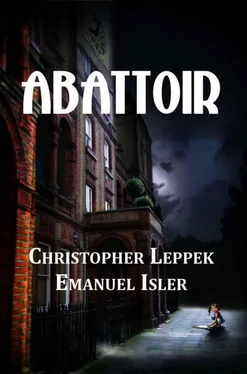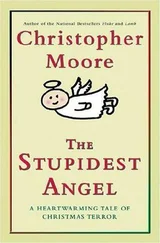Con man. She angrily shut off the TV. Damn charlatan…
Knaster’s education and experience told her one thing—everything had a logical explanation. Spirits and things that went bump in the night were not the stuff of science, and she was a scientific person.
She remembered reading Joseph Campbell and his explanation for fear and myth—how people create myths to put a form to things they don’t understand and are afraid of.
And yet…
Was it rational, was it even possible , that the things that had taken place in the Exeter had no supernatural connection?
Was it reasonable to believe that a millionaire would go mad and burn all of his money; that a wife would murder her husband; that a young man would shoot himself after making love, all in the same building, in just a few months ?
Hell if I know, she thought, sitting at her kitchen table.
Whatever she believed, she had no doubt that she was no more immune to the Exeter than the rest.
For the first time in her life, she’d been having trouble sleeping. The insomnia had been going on for several weeks. She often woke in the middle of the night with the strange sensation that someone was watching her, accompanied by a sense of dread she couldn’t quantify.
Just the other night, she could have sworn that her mother was sitting at the end of the bed, watching her. She could almost smell her rose perfume , so real was the momentary vision. When she rose to a sitting position, there was nothing there but the rumpled form of her blanket .
Her mother had died alone, more than 20 years ago. She’d tried to get there in time, but the plane was delayed by weather. There was nothing she could have done, but she still blamed herself. It horrified her to think that her mother had no idea of who she was, or where, or what goddamn year it was, when she closed her eyes for the final time.
Sharon had spent the last 30 years devoting herself to the study of Alzheimers and still wasn’t even close to anything resembling an answer…
Stop it; stop it right now, before you drive yourself crazy.
This was perverse nostalgia, with a generous sprinkling of good old fashioned guilt… classic patterns. Sometimes she wished the human mind was more like a TV; just the flick of a switch, then blissful nothing…
A sharp knocking at her door jolted her.
Who the hell could that be? She rarely had visitors before nine in the morning. Maybe a cop, or a damn reporter. Hell, maybe even the idiot mystic… ?
No; a surprise more welcome than any of these: Su Ling, with little Anna dressed prettily in pink Oshkosh overalls.
“Su Ling, what a surprise.”
“Are… are we late?”
“I’m sorry… what do you mean?”
“We have an eight o’clock appointment. Or did I get it wrong?”
Knaster was immediately embarrassed. Of course they had an appointment. She’d written it in her journal a week ago.
“I’m sorry, my mistake. Come in.”
Su Ling entered, her silent, expressionless daughter by her side, and took a place on the couch in Knaster’s study. She handed Knaster a small bundle of notebook paper. The doctor immediately knew what it was.
The scribbling was, for the most part, as indecipherable as all of Anna’s earlier work. Still, Knaster took the time to examine each one carefully, as if reading an unbound manuscript, page by page.
“There is one thing you should know, Sharon,” Su Ling said as Knaster examined the papers. “Anna went almost a whole week without drawing anything. Then, last night—just before that gun went off—I found her in her room. All of these came from last night. She was at it for almost an hour.”
“Indeed,” Knaster replied, her eyes returning to Anna’s work.
Erratic, random lines and circles; scrawlings; violent, jagged forms. As always, they appeared to be without logic.
But one page was different. Su Ling had kept it separate from the others, and gave it to Sharon when she was finished with them.
“What do you make of this one?”
Knaster gasped when she saw it.
An eye—a large, staring, horrified eye.
The composition and shading showed amazing skill; astounding even, considering the artist’s age.
Knaster looked at Anna and held the picture up for the girl to see.
“Anna,” she said quietly. “Is this your eye that you’ve drawn?”
No words, no reaction.
She turned to Su Ling.
“This is remarkable.”
Su Ling nodded. “I know. I realized that the minute I saw it. What do you think it means?”
“I don’t know, but it gives me hope. It’s a beginning of some sort, I’m sure of it.”
Su Ling smiled. She might not have had she known what Knaster was thinking:
Whatever it was that eye was looking at, she thought, I hope I never see it.
Sharon Knaster couldn’t get the image of the eye out of her mind.
There was something frantic, demented , about it. It haunted her. Since Su Ling had brought the drawings earlier that day, she’d found herself unable to concentrate on anything else.
The day had been quiet and uneventful. She couldn’t remember the last time she didn’t get at least one call from the hospital concerning a patient.
So quiet… strange, considering her fellow tenants, not to mention recent events.
The only sound in her flat was the ticking of the mantle clock. Sharon didn’t notice when it stopped, grew silent for a few seconds, then resumed.
She couldn’t get her mind off Anna’s drawings. Healthy children invariably drew pictures of happy things—trees, birds, mom and dad, flowers, circuses and houses with crooked chimneys. They were simple and innocent, just like the artists who had created them.
She thought back to her own pictures that she’d drawn at Anna’s age. A smile lit up her face as she remembered showing off a picture of Tawny, the family dog, rendered in new Crayola. Her mom and dad beamed when they saw the crude picture; the pride she felt at that moment had stayed with her all these years…
Sharon’s smile faltered. It had been so many years, so much pain…
Her mother’s favorite meal was Sunday night. Roast chicken, squash, mashed potatoes, green beans, always a pie for dessert. The menu seldom varied, simply because no one ever complained. Everyone loved it, but little Sharon particularly longed for Sunday afternoons, when the entire house would be filled with the delicious aromas of cooking.
Sharon’s eyes turned to her own kitchen as her reverie deepened. She saw her mother—dead these 20 years—still young and strong, busy at work, rattling pots and pans, selecting spices and stirring. She was short, hair tied back neatly in a bun, and she always wore a red smock when she cooked.
The kitchen in that lovely old house in Des Moines was old-fashioned and impractical—ancient linoleum on the floor, battered wainscot on the walls and an old gas stove that seemed to take up half the room—but to little Sharon, it was heaven on earth. Especially on Sundays.
Even now, she thought, here in this strangely silent apartment building, she could smell her mother’s chicken wafting through the air.
Crazy . That was so many Sundays ago. Her mother was long gone. The aroma of her cooking would never fill the air again.
Sharon unconsciously bit her lip as another memory surfaced. Once again, her mother was cooking, but this time she was not at home. She was in the nursing home, the place Sharon was forced to send her after the repeated “wandering” episodes made independence no longer possible.
More than once, Sharon had been forced to call the police after her mother had gone missing. Once they found her wandering zombie-like through a park 20 blocks away from her home. Another time, she was in a mall, in her bedclothes, staring aimlessly at window after window.
Читать дальше












